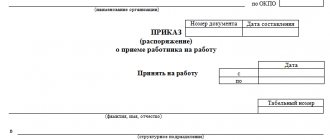General information about the ban
The law does not consider the concept of “ban on traveling abroad” - such an approach would be contrary to constitutional principles. To prevent this from happening, the legislation introduced the concept of “temporary restriction on departure” - a preventive measure, thanks to which a person, due to certain circumstances, does not have the right to leave the territory of the Russian Federation. Such a limitation is not a measure of liability; its essence differs depending on the area of application. For example, in enforcement proceedings, a restriction is a measure of compulsory execution, and in relation to the military we are talking about the characteristics of the service.
A citizen of the Russian Federation may be limited in the right to leave the Russian Federation in accordance with Art. 15 Federal Law No. 114 of August 15, 1996 “On the procedure for entry/exit from the Russian Federation” (hereinafter referred to as Federal Law No. 114). However, this is only the basis; there are other documents regulating this issue:
- Code of Criminal Procedure.
- Federal Law No. 229 of October 2, 2007 “On Enforcement Proceedings” (hereinafter referred to as Federal Law No. 229).
- ZRF No. 5485-1 dated July 21, 1993 “On state secrets.”
- Federal Law No. 53 of March 28, 1998 “On military duty.”
- Order of the Ministry of Internal Affairs, Ministry of Foreign Affairs, FSB No. 3663/135/110 of March 15. 2021 and other regulatory legal acts (LLA).
Reasons why they may not be allowed to go abroad
An exhaustive list of grounds for restrictions is presented in Art. 15 Federal Law No. 114. So, travel abroad can be prohibited in the following cases:
- access to information containing state secrets;
- conscription into the military or entry into alternative service;
- bringing to criminal responsibility as a suspect or accused;
- a court pronouncement of a guilty verdict against a person;
- evasion of fulfillment of financial or other obligations imposed on a citizen by a court within the framework of enforcement proceedings;
- providing migration authorities with false information when applying for a foreign passport;
- employment in state security agencies (FSB);
- declaring a citizen or individual entrepreneur bankrupt.
In accordance with Art. 16 Federal Law No. 114, if travel or departure abroad is restricted for a citizen, he receives a corresponding notification indicating the grounds for such a restriction, the timing of its application, details of the resolution on the basis of which it was adopted, as well as the body responsible for making such a decision. However, even if the notification is not received, the prohibition will still apply - confirmation of its receipt is not required.
The most common reason for restrictions on traveling abroad is debt, so let’s look at it in more detail.
The procedure for introducing a ban
When the court makes a decision regarding the ban on traveling abroad, this document is placed at the disposal of the bailiff. In turn, the bailiff undertakes to notify the defaulter regarding the ban on traveling abroad.
Also, an employee of the authorized body must notify the migration police and border service about the travel ban.
An example of a resolution restricting travel abroad
The decision to ban travel may affect not only those who regularly travel abroad. Sometimes a decision on a travel ban is made in relation to a person who does not have a foreign passport. In this case, the Main Department of Migration Service of the Ministry of Internal Affairs temporarily prohibits issuing a foreign passport to the defaulter.
If a citizen who is subject to a ban on traveling abroad has a foreign passport, then there is no need to give it to the bailiffs. Bailiffs do not have the authority to seize identification documents.
A foreign passport is confiscated only after a court decision, in exceptional cases.
What kind of debts are they not allowed to leave the Russian Federation with?
One of the grounds for sanctions is failure to fulfill the obligations imposed by the court, including those of a financial nature. Simply put, they may not be allowed to leave the country because of debts.
However, the very fact of having a debt does not limit the debtor’s right to leave; for this, enforcement proceedings must be opened.
An important point in this context is the amount of debt. According to Art. 67 Federal Law No. 229 will not be released from the country if you are in debt:
- more than 10 thousand rubles - if we are talking about the collection of alimony, compensation for property or moral damage caused as a result of the commission of a crime, for harm caused to health or associated with the death of the breadwinner;
- more than 30 thousand rubles - for any other requirements (fines, taxes, overdue loans);
- more than 10 thousand rubles - regardless of the nature of the debt, if more than 2 months have passed since the expiration date of voluntary execution (5 days from the date of receipt of the decision to open enforcement proceedings).
In addition, restrictions are imposed on non-property claims.
What debts can lead to a travel ban?
Travel abroad can be prohibited for various reasons, but we are considering the most common option - finances.
Only defaulters can not be released, i.e. those who evade paying their debt. They cannot prohibit departure on the basis of a loan.
The travel ban does not appear automatically. It can be imposed by a bailiff or a court. There is a specific procedure for this.
Having a loan or a fine is not a reason not to let you go abroad. The reason is, for example, a loan debt, an unpaid fine or alimony. But even if there is a debt, the ban does not appear automatically.
The one to whom you owe (Tax, traffic police or bank) can transfer information about debts directly to the Federal Bailiff Service (FSSP).
What debts might cause them to not be released?
A bailiff may prohibit leaving Russia if he finds out that you have:
- loan overdue
- tax not paid
- you don't pay fines,
- you don't pay child support,
- debts for housing and communal services,
- any other debts.
What amount is considered debt?
For a bailiff to ban departure, the debt must be greater
10 thousand rubles:
- for alimony,
- for compensation for harm to health,
- for compensation for damage in connection with the death of the breadwinner
- for compensation for property damage (for example, in case of an accident),
- for compensation for moral damage.
30 thousand rubles:
- for all other debts (for example, a loan or housing and communal services).
Even if your debt falls under the limit of 30 thousand, after 2 months and 5 days (i.e. 2 months after the end of the voluntary repayment period), the bailiff may restrict travel abroad if the debt is not repaid and is at least 10 thousand. Clause 2 of Art. 67 Federal Law on enforcement proceedings.
For example , they began enforcement proceedings for 20 thousand for housing and communal services debts.
You were not prohibited from leaving. But after 2 months and 5 days, the bailiff may prohibit you from leaving, since the debt has not been repaid and exceeds 10 thousand. To prevent this from happening, it is enough to pay at least 11 thousand, then the remaining debt will be less than 10 thousand and departure will not be prohibited.
This does not mean that if you, for example, have unpaid taxes even for a large amount, then the bailiff will immediately find out everything and prohibit you from leaving.
The tax office must transmit this information, and this takes time, since you are not the only taxpayer. Until it’s your turn and your duty and the information has not been passed on to the bailiff, then there can be no ban on leaving.
The debt can be anything. For example, according to a court decision, you owe someone for an accident, but you don’t pay. It may even appear by mistake.
Is it possible to travel abroad with a criminal record?
Another reason for not leaving the Russian Federation is criminal prosecution. The reason for the ban may be the announcement of suspicion, the preparation of an indictment and, accordingly, the acquisition of the status of an accused, or the issuance of a guilty verdict by a court and the acquisition of the status of a convicted person. All these procedural statuses are mistakenly combined by citizens into one concept - criminal record. They say that Russians with a criminal record are not given permission to travel abroad. This is a wrong point of view.
The point is that Art. 15 Federal Law No. 114 clearly establishes the limits of this restriction. Thus, in relation to suspects/accused persons, the ban is relevant until the court verdict comes into force, and for convicted persons - until the completion of the punishment or release from it.
However, a criminal record continues to be valid after serving the sentence - until it is expunged. The term depends on the severity of the penalty applied.
What debts will not allow you to travel abroad from Russia?
Only persistent defaulters can find themselves without the right to travel.
The law sets a maximum debt threshold, which in total cannot exceed 30,000 rubles. This threshold was set only in 2021; previously this amount was much less, but this is only a prerequisite. Only bailiffs have the right to impose restrictions on leaving the country and solely on the basis of a court decision. This process can take a very long time. More than 60 days may pass from the date of the court decision to the day the bailiffs initiate proceedings. In addition, the debtor by law has another 10 days during which this decision can be appealed.
If the decision is not appealed, then the debtor is given about two months to voluntarily close the existing debt. At this time, the debtor has the right to leave the country without any obstacles.
It is also worth clarifying that bailiffs only have the right to restrict travel, and not the obligation.
It is not necessary that this decision will be made and the debtor will be on the list of the Border Control of the FSB of the Russian Federation. But this information can only be clarified in the control strip. Then there is a risk that the trip will be postponed, and there will be no refund for the paid ticket or tour, and responsibility will be placed solely on the debtor.
There are several cases in which it is possible to fly abroad with debts:
- If the total amount of debt does not exceed 30,000 rubles;
- The debt was not confirmed by a court decision;
- The court decision was made, but has not yet entered into force;
- The bailiffs have not yet initiated proceedings in relation to the debt;
- The debtor began to pay the debt, but then there must be a court decision.
But there are also reasons under which a restriction on travel to another country will definitely be imposed:
- Based on the court decision, proceedings were initiated by the bailiffs, and also if there is a writ of execution itself or a court decision in which this circumstance was noted;
- The adopted court decision comes into force if it has not been appealed;
- There is a valid writ of execution, which was presented according to the law within three years from the date of its entry into force;
- The total amount of debt indicated in the writ of execution is more than 10,000 rubles, with the exception of those debts for which there is a limit of 30,000 rubles;
- The debtor does not repay the existing debt, without a valid reason and within the time limits established by law.
If even one of these grounds is absent, then the imposed restriction has the right to challenge and travel to another country.
It is worth knowing that if there is a debt for alimony payments, when paying compensation for harm caused to health, or if the breadwinner of the family has died, if there is a debt for property damage or moral harm, then the restriction on traveling to another country occurs in the amount of 10,000 rubles.
The restriction period can be six months, and the bailiff has the right to impose it on his own initiative or at the request of the debt collector, if the debt is not paid within 60 days.
If a debtor is prohibited from leaving the country, he must be sent a notice that departure will be restricted. The notice is sent to the debtor's registered address or to his residential address.
There are several methods on how to fly abroad with debts. Some methods are legal, other methods are too tricky, which are suitable for inveterate debtors.
Here are some legal ways to cross the border if you have debt:
- The easiest way to go on vacation if you have debts and enforcement proceedings is to pay all existing debts. But you should know that this process may take more than 14 days. After the debt is paid, the bailiff will definitely check that the entire amount has been credited to the account. Then a resolution will be prepared to lift this restriction, and the debtor will no longer be included in the stop list in the updated border control database.
- A restricted debtor has the right to leave the country if there is an urgent quota for foreign treatment.
- Another path is very long and is suitable only for those who have a very large debt and do not have enough money to pay it off. After agreement with the bailiff occurs, you will need to prepare a special petition to the court for the debt to be restructured. After partial debt repayment begins, travel to other countries will be open. The time for this process is not determined; everything will depend entirely on how quickly the court and bailiffs work.
- The last method is completely legal, but a little tricky. The restriction is imposed for only 6 months; as soon as the statute of limitations expires, the court will need to re-issue a decision, and the bailiffs will need to initiate proceedings. As a result, there will be a period of time during which departure will be allowed. There are cases when the debtor will have to prove the illegality of departure if he was not excluded from the blacklist.
The restriction on travel for debtors who are subject to a court decision is not lifted immediately. It usually takes more than two weeks to clear your debt history.
There are a number of conditions under which the ban on traveling abroad for debt will be lifted - these are:
- Full payment of all debts, that is, when the requirement under the writ of execution has been fulfilled in full;
- The parties were able to reach a compromise regarding payment of the debt, including if a settlement agreement was concluded;
- When the six-month limitation period has expired;
- If the writ of execution was canceled or declared invalid;
- The company that acted as a collector was expelled from the Unified State Register of Legal Entities and is no longer a legal entity.
If the debt has been paid in full, the decision to lift the restriction will be made within the next 24 hours. But do not forget about the deadline for sending and processing information at border control. Most often, about 15 days pass from the date of the decision that the restriction has been lifted until the day the border control updates its databases.
So you shouldn’t forget about these deadlines when planning a trip abroad, and also pay off your debt on time. As soon as the payment is made, you will need to come to the bailiff and bring him documents that will confirm payment of the debt. As a result, the time to lift the restriction will be shortened.
It is worth knowing that the bailiff has the right to remove the restriction while it is in effect, and then impose a new one for the next six months. But for this, the debtor must be notified. If the debtor has several proceedings, then the imposition of a ban can occur for each proceeding, but only if all the necessary conditions are present.
We suggest you read: Liquidation of companies and LLCs with debts
If a person decides to check whether he can travel abroad with debts and finds a restriction, then he can travel with a Schengen visa through Lithuania. To do this you will need to do the following:
- Buy a ticket to Kaliningrad on the Yantar train.
- The carriage will need to leave at Vilnius station and go to the airport. From here you can fly to any country in Western Europe. There are no agreements between Latvia and Russia regarding debtor bases.
Whatever routes debtors take to leave the country, it is recommended to return only through direct routes. Border control does not have the right to prevent a debtor from entering his country of residence.
Many debtors know what kind of debt they can’t go abroad with, but what to do if there is an installment plan. Traveling to another country in this case is possible, but only if the restructuring was formalized with the help of a court. To apply for an installment plan, you will need to come to the bailiffs and file a special petition with the court. After the established percentage of the debt amount has been paid, the remaining part can be paid gradually.
If the decision on restructuring is positive, the exit restriction will be lifted. But for travel to other countries, payments will need to be made without delay, otherwise the restriction may be re-imposed.
Procedure for applying a travel ban by bailiffs
As already noted, the mere presence of debts does not become a basis for a ban on leaving the country. To do this, a court decision must be made, enforcement proceedings must be opened, and only in case of evasion of debt payment, a restriction is imposed within its framework. The procedure for applying the ban on traveling abroad by bailiffs is determined by Art. 67 Federal Law No. 229. According to the law, the decision to apply a restriction to a specific debtor is made by the bailiff on his own initiative or on the initiative of the claimant. In general cases, when the amount of debt is above 30 thousand rubles, this can be done within 5 days after the debtor received a resolution to open enforcement proceedings.
If the debt did not arise on the basis of a judicial act (for example, according to a notarial inscription, arrears issued by the Federal Tax Service, etc.), according to clause 3 of Art. 67 Federal Law No. 229, the bailiff does not have the right to independently make a decision on restricting travel - to do this, he must go to court. Thus, the answer to the question whether they can not be released abroad without a court decision will be negative. A court decision is mandatory - to collect the debt or restrict travel.
Taking into account the above, the procedure for applying the measure we are considering is as follows:
- The claimant sends a request for restriction to the bailiff service.
- The bailiff considers the application, makes a decision on the restriction and issues a resolution on restricting travel outside the Russian Federation.
- No later than the next day after the decision is issued, the bailiff registers it in the Automated Information System of the FSSP in accordance with clause 3 of the Procedure approved by Order of the Ministry of Justice No. 187 of September 29, 2017. Then, through the electronic interaction system, the document enters the migration registration system used by border guards.
- The debtor becomes restricted from traveling abroad. When trying to cross the border in accordance with Art. 18 Federal Law No. 114, authorized bodies must confiscate his foreign passport.
In parallel, other enforcement measures may be applied, for example, seizure or restriction of another special right - for example, to drive a car.
To find out what a ban on traveling abroad looks like, let’s turn to Appendix No. 54 to the FSSP Order No. 318 of July 11, 2012. This document approved the form of the bailiff’s decision to restrict travel. This resolution contains:
- information about the bailiff, the FSSP unit, enforcement proceedings and details of the enforcement document;
- data of the creditor and debtor;
- information about the decision taken to restrict travel;
- references to regulations that govern the bailiff.
Readers can see a sample resolution below.
Which country would you rather live in? ⚡ Take the test in 2 minutes
The process of imposing a ban on leaving the country
At the request of a private individual or government organization, a court hearing is scheduled, at which a writ of execution is issued - an order for the mandatory payment of financial resources. In 2021, a decision may be made without the presence of the defendant. After the verdict is passed, a writ of execution is prepared, which is transferred to the Federal Bailiff Service for reporting to the debtor. The document indicates the amount of money, details of an individual or government agency, the deadline for voluntary payment of the debt, which, in accordance with clause 12 of Art. 30 of the Federal Law “On Enforcement Proceedings” dated October 2, 2007 No. 229 - Federal Law is 5 days from the date of receipt of the resolution by the claimant.
IMPORTANT
If, after the specified time, the amount is not deposited into the plaintiff’s account, the bailiff in 2021 will impose a ban on leaving the country for debts. The approved resolution is sent to the defendant, the Federal Migration Service, and border authorities, who enter the citizen into the “black list” of a special database.
How long is the travel restriction in effect?
Let us immediately draw your attention to the fact that the validity period of the restriction on traveling abroad for each of the grounds will differ. For example, for FSB employees and conscript soldiers, the restriction applies during the period of their service, for those admitted to state secrets - for 5 years from the date of the last acquaintance with secret papers.
Since travel restrictions are most often associated with debts, let’s consider the period of its validity. In general, the length of the ban on traveling abroad is regulated by clause 5 of Art. 15 Federal Law No. 114 - until obligations are fulfilled (that is, debt is repaid) or an agreement is reached between the debtor and the collector.
As the FSSP explains, the period of travel ban for debtors is determined by the bailiff; it cannot exceed 6 months. After six months, even if the debt has not been repaid, this restriction is canceled - to extend it, the bailiff must issue a new resolution.
If, by virtue of the requirements of Art. 18 Federal Law No. 114, a citizen’s international passport was previously confiscated; when the restriction is lifted, the document is returned by the migration authorities to the owner.
Customer Reviews
Gratitude from Busygin A.I. I express my gratitude to Vasily Anatolyevich Kavalyauskas for the qualified management of my case, competent advice and justification for the decision, which led to compensation of the stated claims.
Sincerely, Busygin Alexander Ivanovich
26.12.2017
Thanks from Radhuan M.R. Dear Kavaliauskas Vasily Anatolievich. Let me express my sincere gratitude for the qualified legal assistance provided. Thanks to your professionalism, I was able to achieve a decision in my favor. I wish you further prosperity and professionalism.
Radhuan M.R. 06/08/2018
Gratitude to Solovyov I would like to express my deepest gratitude and appreciation to Konstantin Vasilievich Solovyov for his attentive attitude and very competent consultation. And if I ever need legal support, I will definitely turn to him. I would also like to mention Daria Valentinovna Kutuzova, who greeted me with a smile and answered some of my questions. I wish the company success, further prosperity, and more clients.
Review by G.N. Antropova To the lawyer of the Legal Agency of St. Petersburg A.V. Ermakov
I express my gratitude to you for your professionalism in protecting my interests in a criminal case, Andrey Valerievich, allow me to express my gratitude to you for your help and support. I note your high professionalism and skillful actions in defending my positions.
Best regards, G.N. Antropov
Thanks to Stepanov D.Yu. I express my deep gratitude to lawyer Denis Yuryevich Stepanov for his high professionalism and attentiveness to his case when considering the issue in word with a contractor who improperly completed the work of erecting a screw foundation. The cost of the work amounted to 178,300 rubles. And the court of the Vyborg district (Case No. 2-1432/2018) dated March 12, 2018) to collect, taking into account all fines, 504,800 rubles. Once again, I thank you and wish you success in your future work and only successful business conduct.
Grateful to you, your client. 05/18/18
Gratitude from gr. Tiuntsova G. A. I asked for advice from your “Legal Agency of St. Petersburg” - regarding deception by one person who presented himself as an employee of Rospotrebnadzor of the Krasnoselsky district, Novichkov A. A. Offered me a service - before the New Year, go on a tourist trade union voucher to Moscow on the Sapsan railway transport. I refused due to the manipulation of the placement of seats - in different trains, and then by car. Lawyer Sergei Vyacheslavovich Mavrichev handled this case and provided consultations. I thank you for such a sensitive and attentive attitude in office work, which was denied at the 58th police department of the Vyborg district, under Art. 24, 144, 145 of the Code of Criminal Procedure of the Russian Federation, I now have the right to appeal the conclusion and will send an application for further investigation to the district prosecutor's office.
Tiuntsov G. A.
8
Review by Marcheilo I.V. On September 24, 2021, I turned to Konstantin Vasilievich for legal advice. I would like to express my gratitude for your sensitive, attentive attitude and qualified assistance. I received a comprehensive answer to all my questions. They helped a lot. Thank you! Sincerely, Marcheilo Irina Vladimirovna.
Review by Gavrichkova A.N. I would like to express my deepest gratitude to Yuri Vladimirovich Sukhovarov for his humane attitude towards my problem and detailed professional advice on solving it. I wish I could meet such people in my life more often.
Sincerely, Gavrichkov Alexander Nikolaevich.
Gratitude from Ivanov I express my gratitude to Vasily Anatolyevich for the correct and competent legal assistance in solving my case. I wish you and your entire company prosperity and success.
With all my heart, V.V. Ivanov. 05/10/2018
Thanks to Mavrichev S.V. from Bars Dan A. I thank the wonderful Lawyer Sergei Vyacheslavovich Mavrichev for thorough, competent advice and human mutual assistance to all his clients who are in deep need of qualified and timely legal and psychological advice.
Leopard Dana A. 09/18/2018
How to find out if there are travel restrictions
Information about the ban on traveling abroad must be conveyed to the citizen. For this purpose, the bailiff, guided by clause 10 of Art. 67 Federal Law No. 229, sends a copy of the resolution to the debtor no later than the next day. However, if the debtor does not live at the address indicated in the executive documents, he may not know about the existence of such a prohibition. In order not to receive unpleasant news when passing border control, it is recommended to check for prohibitions before traveling:
- verified website “Nevylet.RF”;
- using the FSSP Enforcement Proceedings Data Bank, where you can find information about open proceedings, the amount of debt and contacts of the bailiff who is handling the case and will inform you about the existence of a restriction;
- by contacting the FSSP unit at your place of residence;
- using special Internet services that, for an additional fee, will provide the necessary information within a few minutes.
Is it possible to quickly lift the travel restriction after paying all debts?
Even if the debtor pays the debt within a short period of time, in order for the restriction to be lifted, some bureaucratic delays will have to be overcome.
Before you go abroad with debts in 2021 that have already been paid, you will need to go to the bailiff who initiated this proceeding.
In this case, the following algorithm is used:
- The bailiff should be given photocopies of all supporting documents regarding payment of the debt;
- In return, the bailiff will issue a decree stating that the restriction has been lifted; do not forget that this document must bear the official seal and all the necessary signatures.
- Specify the time frame within which the information will be sent to border control.
- You can wait until the restriction is lifted, counting about two weeks.
In practice, information is processed no earlier than within 10 days, which means that until this time the travel ban will not be lifted.
You should not naively believe that you will be able to completely repay the debt at the airport and go in the planned direction.
To lift the restriction, the bailiff must issue a corresponding ruling, and this will happen only the next day after the funds arrive in the recipient’s account. He must send a copy of the decision to the migration and border services within 3 days.
How to remove the restriction
There are several reasons why the restriction on traveling abroad should be lifted:
- Debt repayment. In this case, the bailiff is obliged to issue a resolution to lift the restriction no later than the next day after receiving information about the payment of the debt.
- Termination or termination of enforcement proceedings. In accordance with paragraph 1 of Art. 44, paragraph 4, art. 47 Federal Law No. 229 in the event of termination (for example, after reconciliation between the debtor and the claimant, invalidation of the writ of execution, etc.) or completion (for example, if it is impossible to establish the whereabouts of the debtor or his lack of liquid property) of the proceedings, the ban must be lifted. If the enforcement proceedings are terminated, they will be released abroad without any problems.
- Appeal against the decision. For example, if the conditions for its imposition are not met (the amount, terms, etc. do not correspond). In addition, a complaint can be submitted to the leadership of the FSSP - the chief bailiff - within 10 days after becoming aware of the violation.
For other methods, read the article “How to lift the ban on debtors traveling abroad.”
How to check for restrictions
To prevent unnecessary spending of money on buying a ticket, and to eliminate the risk of plans being disrupted, you need to check the existence of prohibitions at least two weeks before the intended trip. The online service “Rosdlogli” will help with this. On the website https://rosdolgi.ru/proverit-zapret-na-viezd you can quickly check your existing obligations on all points, including court cases and taxes. To do this you need:
- go to the appropriate page and indicate the region from the list of available ones;
- fill in personal information full name and date of birth;
- indicate the TIN, check the box about the availability of a car (fill in the data on the vehicle);
- write your email address.
You can receive a complete mailbox information card with a free SMS notification after paying for the service. The cost of the latter is symbolic and amounts to only 199 rubles.
To remove travel restrictions, it is necessary to fulfill the requirements of the writ of execution or negotiate a settlement agreement with the other party.
Is it possible to leave the country with debts?
As stated above, debt repayment is far from the only reason why the travel ban will be lifted in 2021. For example, in the event of an appeal against a bailiff’s decision as unlawful or termination/completion of enforcement proceedings without actual execution, the debt itself does not disappear. However, the ban on leaving the country is lifted.
In addition, there are other mechanisms for leaving with debts. For example, in accordance with FSSP Letter No. 12/01-18554-AP dated 08/01/2012, it is possible to cancel the temporary restriction on travel in the event of:
- the need for emergency treatment of the debtor outside the Russian Federation (if treatment is impossible in Russia);
- the need to accompany a relative who needs urgent treatment, or the death of a loved one living abroad.
To do this, a petition is submitted with justification and documentary evidence of the specified reasons. Read more about this in the article “How to travel abroad with debts.”
Why won't they let you go abroad?
Restriction of the debtor's rights to free movement outside the Russian Federation begins from the moment procedural decisions are made.
If you have not received a court ruling, which often happens due to the work of the post office, you can find out about the initiation of enforcement proceedings on the website of the Federal Bailiff Service: fssprus.ru/iss/ip/ Access to the database is free and easy. Information is provided after entering personal data into the request fields: name, year of birth, region of residence. The portal informs about the debt for which enforcement proceedings have been initiated :
- tax debts;
- rent payments;
- fines for traffic violations;
- alimony;
- private loans;
- loan payments (including guarantees for loans from third parties);
- debt to bailiffs.
An obstacle to traveling abroad is the total amount of debt exceeding thirty thousand rubles. It could also be various fines for administrative offenses, old debts, the total executive liability for which exceeded the fourth ten thousand rubles.
Only a court decision and the initiation of enforcement proceedings by bailiffs can become an obstacle to the debtor leaving the Russian Federation.
The absence of debts on the FSSP website is not a 100% guarantee of the absence of travel bans. Data arrives in the database with a delay of two weeks. You can find out the latest information on all debts and unclosed loans, which may not be in the FSSP database, and the probability of a successful departure from the report by filling out the form below:
FAQ
Above we discussed questions that readers may have. If some remain unexplained, ask them in the comments or look for the answer to them in this section.
Can a bank prohibit travel abroad without a court hearing?
The law establishes a clear procedure for introducing restrictions. The bank cannot prohibit travel abroad without a court, since it is not vested with such powers. To introduce this ban, a financial organization must first file a lawsuit to collect the debt, then submit a writ of execution to the FSSP. And only after the commencement of proceedings and the expiration of the period for voluntary execution can the bank apply for the introduction of a restriction for the debtor. Without going through all these stages, traveling abroad is not prohibited.
Who imposes a ban on traveling abroad?
Both the judicial authorities and the post-trial authority impose restrictions on travel within the framework of their powers. So, bailiffs do this if they have judicial acts or executive documents issued on their basis. Only a court can prohibit departure, therefore, if enforcement documents were issued by other competent authorities, the bailiff additionally applies to the court.
How to restrict a debtor’s travel abroad if he owes me a lot
In this case, a travel ban may be imposed if:
- the amount of debt is above 30 thousand rubles (10 thousand rubles if it is alimony/compensation for harm or 2 months have passed since the expiration of the voluntary payment of the debt);
- there is a court decision on collection;
- Based on the court decision and the writ of execution, enforcement proceedings were opened.
If these conditions are met, all that is needed is to send a petition to the bailiff to restrict the debtor from leaving the country, if he has not already done so on his own initiative.
Can a police officer travel abroad?
A partial ban has been introduced for police officers - they can travel to a limited number of countries. You will find more useful information in the material “Can police officers travel abroad?”
Court decisions
Intellectual law: The highest measure of taste
Problems with a travel agency
Measurer's mistake of 30 thousand: the window installation company paid for the miscalculation
How to get your money back for poor performance and missed deadlines
Land marking without the consent of neighbors
The case of an unprovided service, or How to return the money paid








